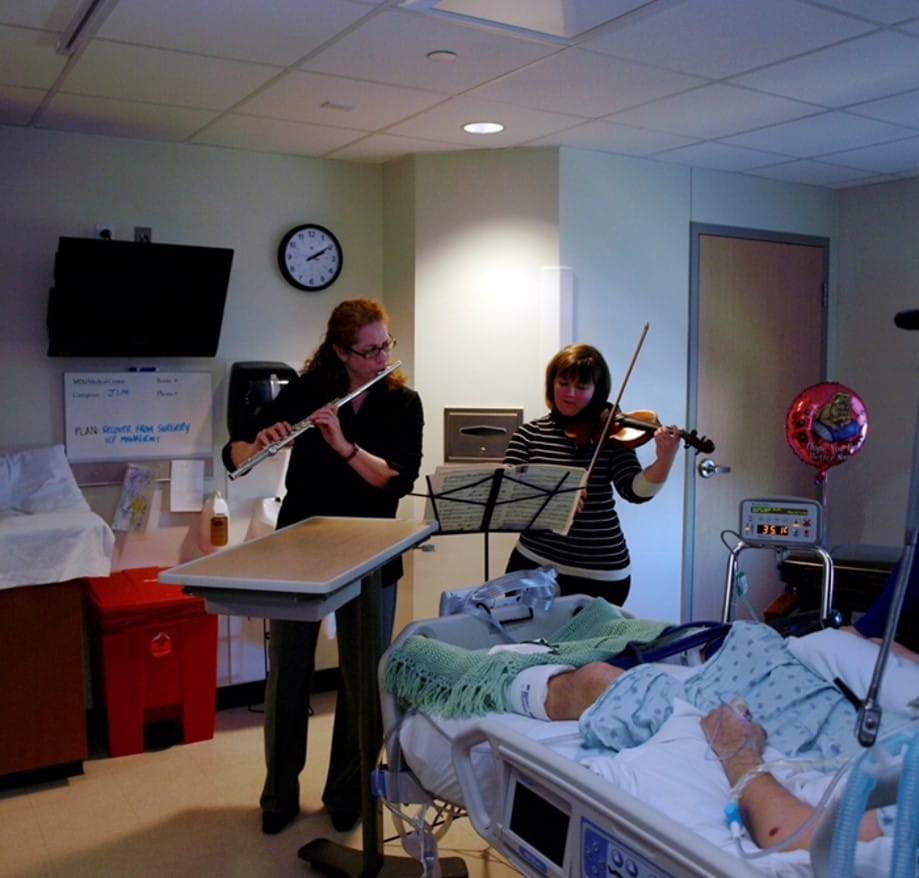Musicians on Call club bridges gap between music and medicine

Members of Musicians on Call perform for hospital patients. Photo courtesy of Muzi Branch
Katie Farthing, Staff Writer
Music students have revived the Musicians on Call program which sends students to perform at the VCU Main Hospital on the Medical College of Virginia campus and other areas, like at food drives, according to Ammar Jawad, a senior music major and club president.
Jawad wanted to align both his interests of becoming a doctor and a musician, according to Jawad.
“Musicians on Call is basically a way to bridge the gap between the ideas of music and medicine,” Jawad said. “I feel like a lot of people listen to music, but I feel like a lot of people don’t really consider music to be a healing thing.”
The club aims to sing at VCU Health and other underserved areas of our community, like food drives and elderly homes, on the first and third Friday of every month, according to Jawad.
The club is open to any student and hopes to have its first performance in late March or early April, according to Jawad.
“We’re hoping to get more people on board and really just get as many people involved,” Jawad said. “I feel like a lot of people are scared to be involved in something like this because it’s super tailored towards musicians.”
Jawad said music has helped him through tough times and has become a large part of his life.
“I know that for people who are going through really difficult periods of their life, they’re at the hospital, maybe a couple of songs would make a difference for them,” Jawad said.
While the science behind the music is important, the emotional aspect is the largest focus, Jawad said.
“Music conveys to everybody. It’s like a universal language, anybody can speak any kind of music,” Jawad said.
It doesn’t matter where the club performs in the hospital or how many people pay attention, because it’s all about creating an uplifting environment, according to Jawad.
Musicians on Call is part of Arts in Healthcare in which they “use art in the healing process,” according to Muzi Branch, director of Arts in Healthcare and Musicians on Call.
“We know that when people heal, it takes not only the doctors’ medicine, but sometimes it takes the person’s mental state, their spiritual state and their emotional state,” Branch said.
Musicians will play for patients in the waiting areas and sometimes at patients’ bedsides. Being in the hospital can be an anxious time, and music can help ease them, according to Branch.
“That music sometimes will give them [patients] a sense of calmness,” Branch said. “We know that music is vibration. Its sound is vibration and those vibrations do have an effect on our body.”
Musicians on Call previously existed at VCU in 2006 but didn’t last in the long term due to student schedules, according to Branch.
The most rewarding aspect of the club is seeing how music can help those struggling with mental or physical illness and how people can help others, according to Branch.
“They are using their talent in the service of helping someone else,” Branch said. “It just makes it even more rewarding.”
Musicians on Call therapeutically utilizes music, but it is not music therapy, according to Branch.
Melissa Owens, a board-certified music therapist at VCU Health, stated in an email why music therapy is different from Musicians on Call.
“Music therapy is a clinical discipline that can only be provided by a board-certified music therapist,” Owens stated.
The goals of music therapy can include stress or pain reduction and presenting a channel for self-expression, according to Owens.
Music therapy can help lower blood pressure, improve sleep and mood and reduce pain, according to Owens.
“Our patients have reported decreased levels of stress, anxiety and feelings of hopelessness,” Owens stated. “Even those with dementia, Alzheimer’s disease and traumatic brain injuries can access musical memory and engage in meaningful music making.”


